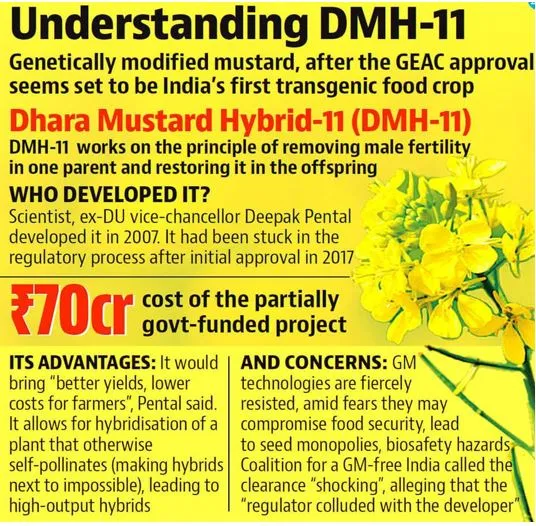

5th August 2024 (9 Topics)
Supreme Court of India has recently delivered a split verdict on the question of allowing genetically modified (GM) mustard in farmer fields.
What are Genetically Modified Crops (GM Crops)?
- Genetically modified (GM) crops are plants used in agriculture, the DNA of which has been modified using genetic engineering techniques.
- In most cases, the aim is to introduce a new trait to the plant that does not occur naturally in the species like resistance to certain pests, diseases, environmental conditions, herbicides, etc.
- Genetic modification is also done to increase the nutritional value, and production of pharmaceuticals, biofuels etc.
- GM crops are also referred as genetically engineered (GE) plants, transgenic crops, living modified organisms (LMOs), or biotech crops.
About GM Crops and Prospects:
- Historical Background: GM crops first introduced in USA in the mid-1990s, are presently widely cultivated and used globally.
- GM crops currently grown are engineered mainly for insect resistance or herbicide tolerance. A total of 16 GM crops are cultivated in various countries out of which corn, soybean, cotton and canola are the four largest acreage.
- Some Major GM Crops in India:
- In India, Bt cotton is the only GM crop approved for cultivation.
- It is grown on approx. 11 million hectares.
- Bt cotton, first grown in 2002 now occupies more than 90% of cotton area in the country.
- Several more crops such as chickpea, pigeonpea, corn, sugarcane, etc. are in various stages of research and field trials.
GM Mustard Debate:
What is GM Mustard?
|

What are challenges related to GM Crops in India?
- The impact of growing GMO crops like GM mustard on the health of the population, the environment (the soil on which it is grown), the food chain, the groundwater, etc., is still unknown.
- GMOs carry risks of ‘unintended’ effects and toxicity due to changes made at genetic level which would be irreversible
- Weeds are wild plants that soak up nutrients from the soil and do not allow crops to absorb the nutrients.
- GMOs can pose significant allergy risks. Genetic enhancements often combine proteins not contained in the original organism, which can cause allergic reactions for humans.
- GMOs also carry risk of affecting the biodiversity by compromising the gene pool of wild varieties of crops.
- GMOs also carry a financial burden for producers as seeds have to be bought new from the GM crop companies for every crop.
- They also carry ethical concerns like violation of natural organisms’ intrinsic values, and tampering with nature by mixing genes among species.


